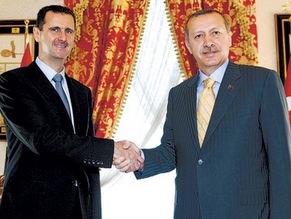|
World Jewish News

Assad, left, shaking Erdogan’s hand during a meeting in 2009. Photo by: AP
|
Turkey fears it may lose influence as Syria roils
18.05.2011, Israel and the World To judge from recent comments, Turkish Prime Minister Recep Tayyip Erdogan sees unrest in Egypt and Syria as sharing a common thread. "[Syrian President Bashar] Assad must not reject his nation's demands for peace and democracy," he said in an interview with the American journalist, Charlie Rose, on PBS. Those are more or less the same words he used some two months ago when he proposed to then Egyptian President Hosni Mubarak "to respond to the demands of his nation and to carry out immediate reforms."
But that is where the similarity in his ties to the two leaders ends. Erdogan's relations with Mubarak were unfriendly, even tense. Mubarak did not allow Erdogan to intervene in the conflicts in the Middle East, he despised the Islamist and "Ottoman" tendencies of his foreign minister, Ahmet Davutoglo, while the closeness between Turkey, Syria and Iran turned Turkey into a suspect country in the eyes of Mubarak.
Unlike the personal chemistry between Erdogan and Assad, which was expressed in the frequent visits by Erdogan and his senior representatives to Damascus and the many and friendly telephone calls between them, ties between Erdogan and Mubarak were chilly.
It is therefore not surprising that two weeks after the protests broke out in Egypt, Erdogan called on Mubarak not only to carry out reforms but also to step down.
On the other hand, when NATO decided to attack Libya, where Turkey has some $1.5 billion in investments, Erdogan condemned the attacks even though Ankara had supported the Arab League's decision to create a no-fly zone over Libya.
Only on May 3, when it saw that even Venezuela and African countries were demanding that Libyan leader Col. Muammar Gadhafi step down, did Turkey join in.
Nevertheless Ankara is still interested in finding a solutions that ends the Libyan crisis without Gadhafi's ouster.
Turkey's stance vis-a-vis Syria is much more complex. When Erdogan was asked last week if the time had not come to call on Assad to resign, he replied: "It is too early to make a decision now because the final decision will be made by the Syrian people. The unity of Syria must be preserved."
Erdogan told the press he and Assad were personal friends and that he had advised Assad to institute the reforms at an early stage, even before the demonstrations began.
But what annoyed the Syrians was Erdogan's remarks in Turkey against the use of force and the fear of "a new Halabja and Hama," referring to the use of chemical weapons by Iraq against the Kurds, and the massacre of 10,000 residents of Hama in 1982 by Assad's father, Hafez Assad.
The Syrian newspaper Al-Wattan, which is owned by Rami Makhlouf, Bashar Assad's cousin and the richest man in the country, launched an unprecedented attack against the Turkish declarations.
"Since the start of the recent events in Syria, the official Turkish echelon has demonstrated haste and improvisation," the paper wrote. "It seems that the preaching in favor of reforms that is being manifested vociferously by Erdogan on every possible stage in Europe, and that of the new Ottoman engineer, the foreign minister Davutoglo, do not provide any special means of bringing about solutions to the invented difficulties so as to deal openly and clearly with these events."
Makhlouf's paper didn't stop there. "If the political and economic prosperity that Turkey enjoys must be attributed to its secular history and to the strategic corrections made by Davutoglo, then the way it is being conducted in the face of the Syrian question is likely to cause it to take a step back," it continued.
Erdogan, who attributes Turkey's economic prosperity to himself - and justly so - was surely not happy to read the translation of these remarks, especially since the volume of Turkish trade with Syria stands at some $2 billion.
Last week a representative of the Muslim Brotherhood from Syria, Mohammed Riad Shafeka, visited Istanbul and told the Turkish media that his movement was indeed the moving force behind the protests in Syria. By doing so, he actually played straight into the hands of Assad's regime, which has claimed all along that the disturbances were being caused by Islamic extremists and separatists.
Syria does not understand why Ankara allowed Shafeka to go to Istanbul from his exile in Yemen and why its media were allowed to interview him. And indeed Erdogan hastened to declare through his foreign ministry spokesman, that "Turkey will not allow any initiative on the part of the Muslim Brotherhood to harm the execution of reforms in Syria."
According to reports from Turkey, Syria has sent information to the head of Turkish Intelligence, Hakan Fidan, showing that the Muslim Brotherhood was involved in shooting at Syrian security forces during the protests, so as to counter the declarations by Erdogan that "there are no armed gangs in Syria," contrary to what the Syrian regime claimed.
Erdogan explained that what is happening in Syria cannot merely be considered an internal Syrian affair, or merely a matter for Turkish foreign policy.
Turkey is concerned both by the possibility that the Assad regime will fall and by the fact that it does not see who could possibly replace it. Meanwhile it seems that Erdogan and his regime are mainly worried that the all-embracing foreign policy started by his government could crash and have an effect on the results of the elections to be held on June 12.
This policy, which has the slogan "Zero problems with all neighbors," is now coming up against the unexpected reality in which Turkey, despite all its efforts, finds itself floating on stormy waters, without being able to influence the course of events, and being seen as a supporter of the Assad dictatorship.
Haaretz.com
|
|
